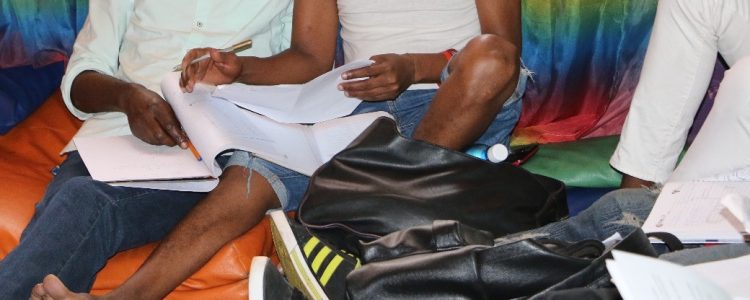
The research programme ‘New roles of CSOs for inclusive development’ investigates the assumptions, solutions and problems underlying the civil society policy framework ‘Dialogue & Dissent’ of the Dutch Ministry of Foreign Affairs. Currently, all the research groups are conducting the empirical part of their research. The ‘Assumptions blog’ provides insight into the fieldwork of the research groups – the researchers share their on-the-ground experiences through this blog. This time, Lise Woensdregt from VU Amsterdam, part of the research group ‘CBOs within the official development aid system in Kenya’, shares her experience from Nairobi, Kenya.
This research explores how the contemporary international development system influences the (political) work of community-based organizations (CBOs) in Nairobi, Kenya. Our fieldwork is centred on two CBOS, the first of which works with youth seeking to escape a life of crime and the other with male sex workers.
On a Friday afternoon, I meet Stella in a restaurant close to one of the CBOs we are studying. The restaurant is close to a mosque and famous for its pilau, a Swahili spiced rice dish. Although the place is popular throughout the week, it is especially busy after Friday prayers. Therefore, when I enter the small restaurant, I see many men and boys in traditional Islamic dress, talking and eating together. I find Stella in the back, sipping on a Mirinda apple. I squeeze in next to her on one of the cushioned benches and we preceded to order some food.
Stella is one of the community researchers in our research project, which uses community-led research (CLR) as one of the methodologies. Within CLR, the ‘insider perspective’ of community members is considered crucial. Community researchers become aware of what they already know (their lived experiences and that of their peers) and use this as the basis for further knowledge creation. In practice, this means that a total of 20 community researchers conduct ethnographic fieldwork in their own community, take notes and write their weekly research journals. This process of data collection is followed by analysis and coding, after which all of them individually choose a specific topic to write about further. The individual chapters will be combined and presented as a popular book in June 2019.
Stella is a community researcher at the CBO focusing on male sex workers in Nairobi. She is a transwoman and has been involved with the CBO for many years. Her group explores the narratives of sex workers and how the CBO features in their daily lives. Stella asked me to meet with her today to work on a chapter addressing mental health among men who have sex with men (MSM) and transgender sex workers. In their talks with community members, the community researchers became aware of how homophobia, stigma and discrimination create social distress, feelings of depression and lack of self-esteem. The researchers came to realize that mental health is often an underlying cause of excessive alcohol and drug use. One of them said: “They are drinking so that they can forget what they are going through”. Sex work in itself is not necessarily traumatizing, however, our findings show that feelings of rejection by family and society, insecurity about the future, as well as daily experiences of violence take their toll on sex workers. Despite this, the researchers agreed that there is very little support for addressing mental health issues among sex workers, as most of the funding goes towards HIV. They also realized that the few programmes that have touched on alcohol and drug use tend to focus on behaviour change, rather than the underlying causes for why sex workers drink.
Our research shows that the CBO is aware of the mental health needs of sex workers in the community. CBO employees express concerns about these issues and consider the current lack of mental health support for sex workers a gap in their programming. However, our research also highlights the difficulties this CBO experiences in obtaining funding that could be used to pursue these objectives. For example, one of their major funders, who primarily focuses on HIV, rejected its proposal to include monthly alcohol and substance abuse sessions in their programme, saying that it is not a priority.
Because Stella sees a need in her community, she is very motivated to write a chapter about mental health. As she said: “I want to write this because I want people to know about the mental health issues we face and the lack of support we currently get”. This example shows how CLR is an innovative way to address the needs that exist within a community. Through CLR, Stella and her fellow community researchers unearthed a root cause of many physical health problems among sex workers, i.e. mental health, which they feel if left unaddressed will render other initiatives focusing on STDs and HIV prevention futile. What’s more, CLR results in a rich, detailed type of data, which can contribute to the broader research project and which is difficult to retrieve otherwise.




